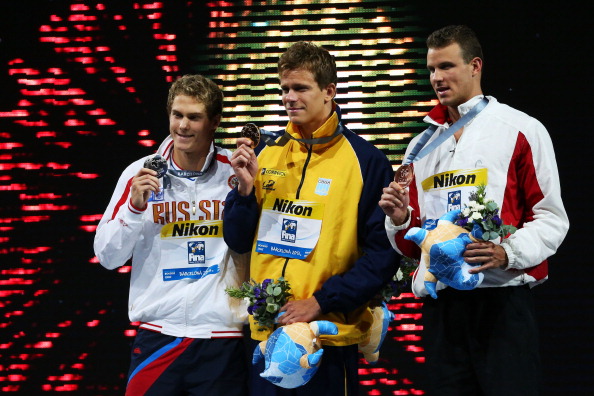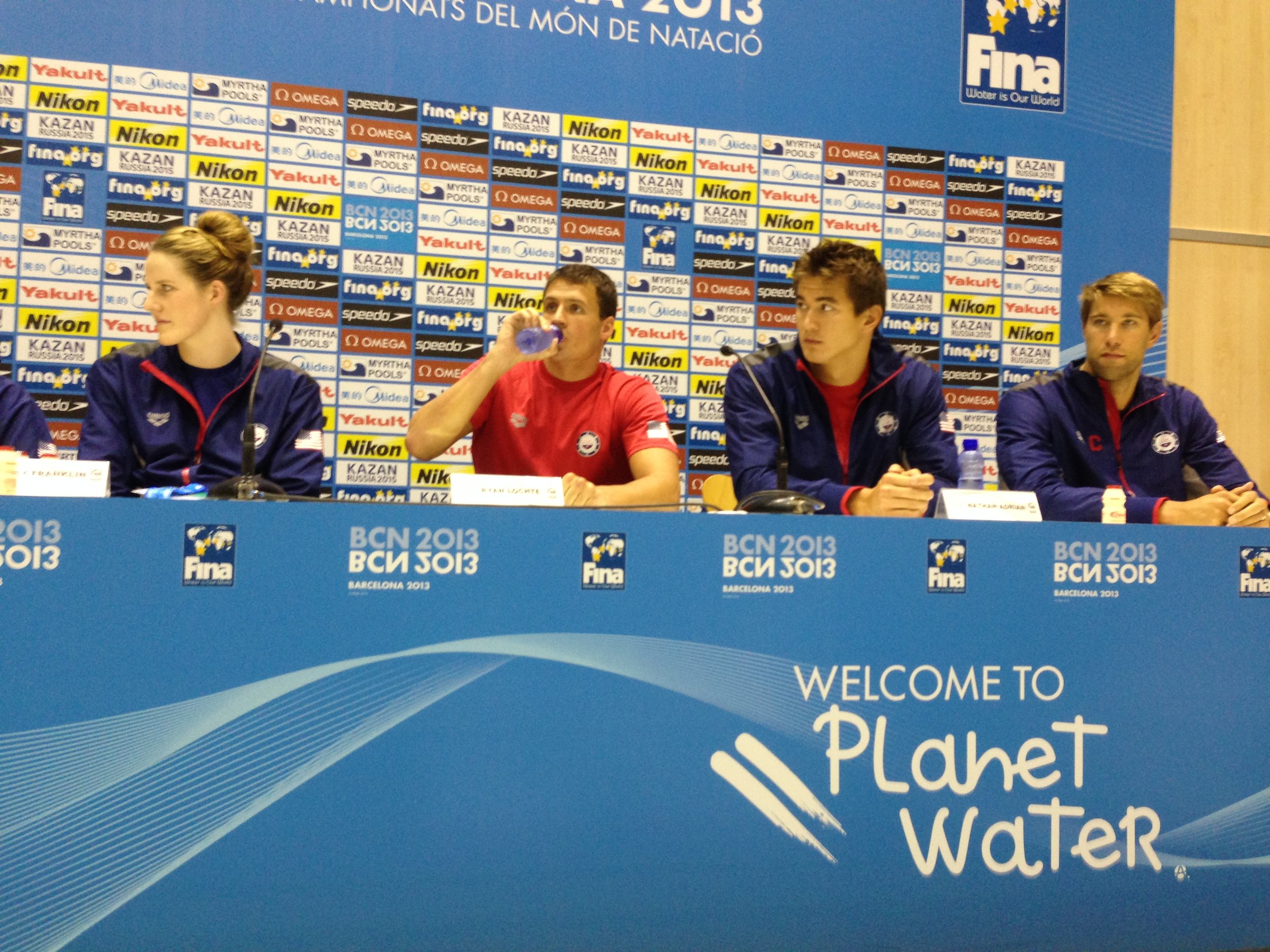Russian swim star and world-record holder Yulia Efimova got a 16-month ban for taking a supplement that included a banned substance. She tested positive for DHEA. That’s for sure a no-no.
Odds are, most of you have never heard of her.
Fair enough.
Moreover, doping cases tend to be repetitive, indeed mundane.
This one is actually interesting, and on a number of different levels.
Here’s why:
Efimova will sit out 2014 and the first two months of 2015, meaning she will likely be back in time for the 2015 world championships in Kazan, Russia, before a home crowd, and to make a run for Rio 2016. Thus she had ample incentive to get this over with.
It's another example of leniency for supplement use. Which on the one hand is entirely appropriate. Supplement use is not, for instance, the same as injecting EPO. On the other, it makes you wonder — when is the message going to get through to elite athletes that supplement use can be reckless and irresponsible?
It’s also another victory for noted lawyer Howard Jacobs of Westlake Village, California. Look, if you have a doping problem, it’s like Ghostbusters — who you gonna call? Howard Jacobs, obviously.
Efimova didn’t even bother to have the B sample tested. She didn’t contest the lab finding. She knew what she had done. Again, this was an issue of negligence and then, for the authorities, seeking to measure liability with common sense.
The three-person FINA Doping Panel ruling was dated Monday.
Efimona competes for Russia but trains at the University of Southern California.
She is now 22. She has been a first-rate swimmer since her teens. She moved to USC when she was 18. At the 2012 London Games, she won bronze in the 200-meter breaststroke. Last year, at the world championships in Barcelona, she would win the finals of both the 50 and 200 breast and set the world-record in the 50, 29.78, in the heats - a mark that Ruta Meilutyte of Lithuania then lowered in the semifinals to 29.48.
She tested positive after last year’s worlds — on Oct. 31, in an out-of-competition test.
She loses four gold medals at the European short-course championships in Denmark. She also loses two short-course world records set late last year, including one pending mark. Two of those four were individual races; two, relays.
The source of the positive was a supplement, Cellucor CLK, that she bought Sept. 16 at a GNC near where she lives in California. She said she relied on the advice she got at the GNC store, alleging that she believed “salespersons at vitamin stores in the United States were well-educated and knowledgable concerning the products they sold.”
She said she was “more inclined to question the qualifications of individuals selling supplements in Russia than in the United States.”
The level of her naiveté, frankly, borders on the breathtaking.
We are now 15 or so years after the creation of the World and U.S. Anti-Doping Agencies, and both have spent much time and energy reaching out to athletes in a bid to make clear they have to know what goes into their bodies.
And here is a world-class swim racer, indeed an Olympic medalist and world champion, relying on the advice of a clerk at a GNC?
From the decision: “Ms. Efimova testified that although she is an elite swimmer who had been through numerous doping controls and although she is aware that she is responsible for what she puts in her body, Ms. Efimova has never been given specific anti-doping education and has never been taught how to be a wise consumer of supplements, a problem her lawyer contended was compounded by the fact that her English is self-taught and by her relative unfamiliarity with the supplement market in the United States.”
How can it be she had never been given specific anti-doping education? Seriously?
Just so everyone understands the responsibilities here — though she has been training for the past four years primarily at USC, the party bearing the burden for educating her is the Russian Swimming Federation.
The panel, apparently being diplomatic, said “the fact that no anti-doping education was provided to Ms. Efimova by the RSF is disappointing and put her at a disadvantage in fulfilling her responsibility to be a savvy consumer.”
Is she alone in that regard? If not, how does that get fixed? If she is not alone, that is a significant problem, particularly since, again, next year’s worlds will be in Kazan.
A quick look at the label, as the decision noted, would have clearly shown DHEA listed as an ingredient.
As for her English-language abilities:
Efimova has been in the United States for roughly four years. Nobody is asking her to write like Faulkner. But four years? For sure she should be conversant.
Again, the level of the naiveté at issue surely must give the reasonable person pause.
At any rate, all of this is in its way prelude to what may well be the most intriguing part of the matter.
Some context:
Before moving to LA, Efimova had been coached by her father, Andrey. For the five years before that, she had been coached by Irina Vyatchanina. Efimova moved to SoCal to swim with the Trojan Swim Club, headed by coach Dave Salo.
Salo is, simply put, one of the great coaches in the world.
Here is the thing, though:
Two others, Jessica Hardy and Ous Mellouli, had positives while at USC, Hardy for a supplement, Mellouli for Adderall.
Side note: Howard Jacobs represented them both.
Now Hardy and Mellouli are both Olympic medalists and, yes, absolutely, positive role models. For sure. If you were a seventh-grade teacher, you totally would want Jessica Hardy or Ous Mellouli to come to your class and tell your kids their story of achievement.
Two other notes:
Salo had nothing to do with either positive test.
And he had nothing to do with Efimova’s positive.
In swim circles, however, there have been whispers — like, what is going on there under all that California sunshine?
That’s why perhaps this is maybe the most compelling excerpt in the entire decision, the panel devoting an entire paragraph to it, because what is more essential than someone’s reputation?
“According to Ms. Efimova, her coach at the Trojan Swim Club, David Salo, is adamantly opposed to the use of supplements of any kind. She said her coach frequently tells his swimmers that they can get all the nutrition they need through a well-balanced diet and that supplements are unnecessary.”
If you move halfway around the world … to place your trust in your coach … and your coach is one of the best … and he says don’t use supplements … and you do, anyway … it’s appropriate for the right people to stand up for the coach, in black and white, for everyone to see, when that coach is showing appropriate leadership.
So let’s everyone recognize, as the FINA Doping Panel did, too, that Dave Salo did the right thing here.
And Yulia Efimova made a mistake.
And — despite the fact that USADA, WADA and other responsible agencies — are screaming from the rooftops not to take supplements, that message is somehow not getting across fully and completely.
So, where are we, and — to quote that most famous of Russian aphorisms — what is to be done?





